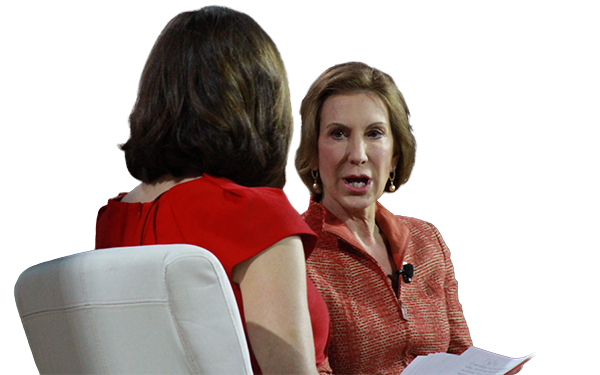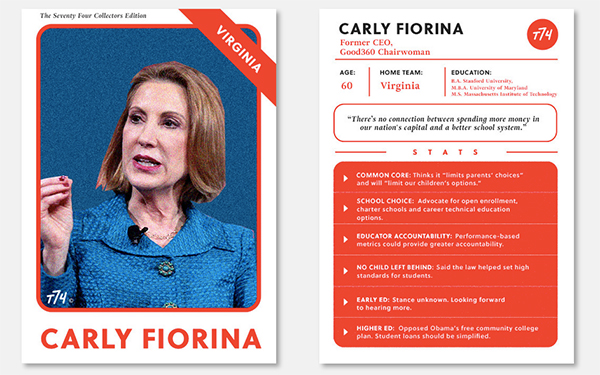NH Summit: Carly Fiorina Decries Federal Education Bureaucracy, Says It’s Killing School Innovation

Manchester, New Hampshire (See full coverage of our 2015 NH Education Summit)
“What doesn’t work are big bureaucratic programs from Washington, D.C. What doesn’t work are people spending money on mandated programs, either at the state or federal level,” she said, saying instead that the focus should be on innovation at the local level.

As president, Fiorina said she would take power away from herself and devolve it to local communities and schools. In addition to the federal government, she sharply criticized teachers unions — saying they “personify the status quo” — but at the same time she raised questions about over-testing, echoing criticisms voiced by many teachers and their unions.
Throughout the discussion Fiorina criticized the Department of Education, saying it gets in the way and spends too much money. (About 10 percent of education spending comes from the federal government, with the remainder coming from states and districts.) She said that among the first things she would do is audit the department, saying, “We don’t know what the Department of Education does any more.”
The department does issue detailed annual fiscal reports.
Fiorina chastised the Obama administration’s Raise to the Top initiative, and its support for the Common Core standards. The rhetoric was a sharp departure from Fiorina’s position when she ran for Senate in California in 2010. At the time, she praised Race to the Top as putting in “place some critically important accountability measures” which include “internationally benchmarked standards and assessments.” When asked about these statements, Fiorina said she continued to support high academic standards, but opposes “a federally mandated program” that she said restricts how teachers teach.

(See also: The Seventy Four’s presidential candidate baseball cards and our campaign preview of Fiorina and education policy.)
Fiorina also argued that the standards have turned into “a program that honestly is being overly influenced by companies that have something to gain, testing companies and textbook companies.”
Also, she said, the influence of the federal bureaucracy had led to over-testing: “Teachers feel they have to teach to the test and kids feel they have to learn to the test.” Through the Race to the Top program and No Child Left Behind waivers, the Obama administration has incentivized the creation of new teacher evaluation systems, which in many cases require a battery of new assessments.
She praised a broad-based education: “Children have to be exposed to art, to music, to philosophy, to history.” Education should prepare students to become citizens, she said — adding that in fact, maybe all students should take the U.S. citizenship test.

Fiorina backs the version of the re-authorization of the Elementary and Secondary Education Act passed by the U.S. House, specifically because it would give more autonomy to states in using federal money and allow parents to opt out of standardized tests. Separate reauthorization bills were recently passed by both the House and Senate; a conference committee will attempt to hash out the differences.
Fiorina said that education reform should be bi-partisan, but argued, “The Democrat party is on the wrong side of this issue.” She claimed that too often teachers unions have blocked meaningful reform, and stopped the expansion of school choice. Fiorina also said that spending more money will not improve outcomes.
(Some research finds that additional resources can benefit students.)
She praised a variety of education initiatives — New Orleans’ school choice system, performance pay for teachers, school vouchers, the California tenure lawsuit — but did not say what, if anything, she would do to expand these programs as president. Her emphasis on local control and reducing the federal bureaucracy suggested that a Fiorina administration would do less at the federal level, not more, to improve education.
“We can have the most creative and smartest people in the world,” Fiorina said, “but not if we keep deciding that the federal government knows how to innovate, because it does not."
Photo by Brian Jodice
See our complete coverage of the 2015 New Hampshire Education Summit
Get stories like these delivered straight to your inbox. Sign up for The 74 Newsletter

;)
